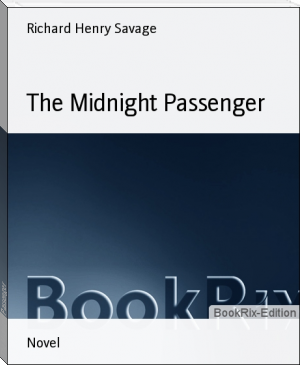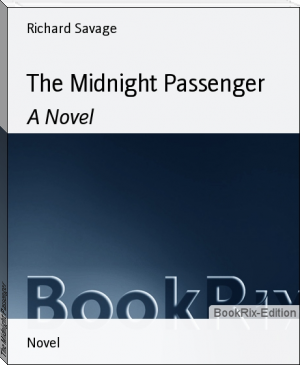The Midnight Passenger - Richard Henry Savage (books like harry potter .txt) 📗

- Author: Richard Henry Savage
Book online «The Midnight Passenger - Richard Henry Savage (books like harry potter .txt) 📗». Author Richard Henry Savage
CONTENTS
BOOK I
UNDER THE ARCH
I. The Danube Picture
II. Tidings of Great Joy
III. In Magdal's Pharmacy
IV. Under the Shadows of the Brooklyn Bridge
V. Breakers Ahead! Checkmate! Mr. Arthur Ferris
Works in the Dark
BOOK II
AN INSIDE RING
VI. Dreaming by the Sea
VII. "This May Be My Last Bank Deposit"
VIII. The Strange Tug's Voyage
IX. The Lightning Stroke of Fate
X. A Cruel Legacy
BOOK III
THE MESSAGE FROM AMOY
XI. The Girl Bride's Rebellion
XII. The Lonely Pursuer
XIII. On the Yacht "Rambler"
XIV. Irma Gluyas
XV. Miss Worthington Shares Her Secret
BOOK I.
UNDER THE ARCH.
CHAPTER I.
THE DANUBE PICTURE.
There was no air of uncertainty upon the handsome countenance of Mr. Randall Clayton as he stepped out of the elevator of a sedate Fourteenth Street business building and approvingly sniffed the April morning breeze.
On this particular Saturday of ninety-seven, the shopping multitude was already pouring from the Scylla of Simpson, Crawford & Simpson's on Sixth Avenue - and its Charybdis of the Big Store - past the jungles of Altman's, Ehrich's and O'Neill's - to dash feebly upon the buttressed corner of Macy's, and then die away in refluent, diverted waves, lost in the fastnesses of McCreery's and Wanamaker's, far down Broadway.
The pulses of the young man were vaguely thrilled with the coming of spring, and so he complacently took in the never-ceasing tide of eager women, on the street's shady side, with one comprehensive and kindly glance.
For six long years he had cautiously studied that same sea of always anxious faces! He well knew all the types from the disdainful woman of fashion, the crafty daughter of sin, the vacuous country visitor, down to the argus-eyed mere de famille, sternly resolute in her set purpose of making three dollars take the place of five, by some heaven-sent bargain.
Countless times he had threaded this restless multitude, with an alert devotion to the interests of the Western Trading Company. He was, to the ordinary lounger, but the type of the average well-groomed New York business man.
And yet, his watchful eyes swept keenly to right and left, as he breasted the singularly inharmonious waves of the weaker sex.
His left hand firmly gripped a Russian leather portmanteau of substantial construction, while his right lay loosely in the pocket of his modish spring overcoat.
To one having the gift of Asmodeus, that well-gloved right hand would have been revealed as resting upon the handle of a heavy revolver, and the contents of the tourist-looking portmanteau been known as some thirty-eight thousand dollars in well-thumbed currency and greasy checks of polyglot signatures.
It was the "short day" of the week's business, and the usual route for making his bank deposit lay before him. Down University Place to Eighth Street he was bent, thus avoiding the Broadway crush, and over to the shaded counting rooms of the Astor Place Bank.
Clayton's mind was concentrated, as usual, upon his important business. Few of the neighbors in the great office building knew of the vast interests represented by the modest sign "Western Trading Company."
Certain gray-bearded bookkeepers, a couple of brisk correspondents, a stony-faced woman stenographer, with a couple of ferret-eyed office boys were the office force, besides the travelling manager and Mr. Randall Clayton, the cashier and personal representative of the absent "head," who rarely left his Detroit home to interfere with the well-oiled movements of the "New York end."
But daily, rain or shine, Mr. Randall Clayton himself took his way to the bank to deposit the funds to meet their never-ceasing outflow of Western exchange. There was an air of grave prosperity in the sober offices of the great cattle company which impressed even the casual wanderer.
Silence and decorum marked all the transactions of the weekly messengers, paying in the heavy accounts of the hundreds of New York butchers who drew their daily supplies from these great occidental cattle handlers. The various departments of the great business were always kept as sealed books to each other, and only Emil Einstein, Clayton's own office boy, knew how much treasure was daily packed away into that innocent looking portmanteau.
Mr. Somers, the head accountant, with a grave bow, always verified the sealed delivery slip of the funds, and compared it with the returned bank books, carefully filing away all these in his own private safe with Clayton's returned list of Western and Southern exchange.
On the sunny April morning, Randall Clayton was weary of the confining life of the silence haunted office rooms, where he patiently bore the strain of his grave duties, with a cautious avoidance of useless communication, fencing him even from his fellow employees.
As he strode along the crowded street, his jaded soul yearned for the wild majesty of the far off Montana mountains, and the untrammeled life of the Western frontier, given up perforce, when his father's death had left him, twelve years before, alone in the world.
"The same old daily grind," he murmured. "Oh! For one good long gallop on the lonely prairies - a day in the forest with the antlered elk, an afternoon among the gray boulders of the McCloud River."
He sighed as he recalled his drudging rise in business, since his father's old partner had set his life work out before him, when the lonely boy had finished with honor his course at Ann Arbor.
Four years at college, two with "the chief," under his own watchful eye, and then that six years of a dragging upward pull in the New York office had made a man of him; but, only a self-contained and prematurely jaded man.
"It's too much to lose," he muttered, as he thought of his hardly earned promotion, his four thousand a year, and - the future prospects. He was the envy of his limited coterie, even though his few intimates looked with a certain awe upon a man who was obliged to file a bond of fifty thousand dollars for his vast pecuniary handlings.
For the great association of Western cattle men were hard taskmasters and only the head lawyers in Detroit knew that Hugh Worthington had annually sent in his own personal check to the Fidelity Company to pay the dues of the bond of the son of a man to whom he had owed his own first rise.
"It's too hard," mused his patron, "to spy on the lad and then make him pay for it. But it has to be," he sighed. "There are the snares and pitfalls."
Many an eye approvingly followed the stalwart young man still in the flush of his unsapped vigor, at twenty-eight, as the tall form swept on through the crowds of polyglot women.
There was a healthy tan on Clayton's face, his brown hair crisply curled upon a well-set head, his keen blue eye and soldierly mustache finely setting off a frank and engaging countenance.
The grave sense of gratitude, his place of trust, the stern admonitions of his sententious patron, Worthington, and the counsel of his only chum - a hard-headed young New York lawyer - had kept him so far from the prehensile clutches of the Jezebel-infested Tenderloin.
Clay ton had fallen judiciously into the haven of a well-chosen apartment, sharing his intimacy only with Arthur Ferris, the brisk-eyed advocate whose curt office missive always enforced the lagging collections of the New York branch.
Simultaneously with his last promotion, however, there came to Clayton the knowledge that he was continuously and systematically watched by the unseen agents of the Fidelity Company.
And, yet strong in his own determination, he bore as a galling chain, growing heavier with the months, the knowledge that the eye of the secret agent would surely follow him, in all the "pleasures" incident to his time of life and rising financial station.
The sword hung over his defenceless head! - too busy for the gad-fly life of the clubs - a strong, lonely swimmer in the tide of New York life, he was as yet a comparative stranger to Folly and her motley crew of merry wantons in gay Gotham.
The theater, some good music, his athletics, and the hastily snatched pleasures of vacation, together with the limp reading of an overwearied man, afforded him such desultory pleasures as fell in his path.
On his way now to a luncheon engagement with his comrade Ferris, at Taylor's, his mind was busied only with the care of the daily treasure trust.
Serenely confident, he swung along, his two score thousand of dollars being a mere ordinary deposit, in a business which, in holiday seasons, and at times of monthly settlements, often stuffed the portmanteau with sums rising the hundred thousand.
His callous eye vainly rested on the peopled loneliness of the bustling crowd, intent only upon the possibility of a sudden dash of some sneak thief, or the chance malignity of some swell "mobsman."
Suddenly Randall Clayton paused in his swinging stride. For a face, rapt in its intense earnestness, broke in upon his gnawing loneliness. A lovely vision, a very Rose of Life's Garden!
"By Jove!" he murmured, as with a new-born craft he lingered for a moment before a window with an "art" display, only to watch the receding form of the unknown beauty, whose single glance had left him standing there spellbound.
There was an exquisite artist proof of a romantic scene upon the Danube displayed in the place of honor, a view of one of the grandly witching defiles where the mighty stream immortalized by Strauss breaks out of the smiling Austrian plains, dashing along into the Iron Gates of gallant Hungary.
He could not, as yet, tell what manner of woman she might be, but his spirit burned within him as he felt the lingering spell of those dark, witching eyes, for they had rested upon his own, in an instant, unguarded glance of sympathy.
Mechanically following on, Clayton noted the refinement of the daintily cut dark dress, veiling a form of ravishing symmetry. There was a single red rose in the Polish toque, and that one touch of color guided him as he followed the gracefully gliding unknown beauty.
Strangely stirred at heart, he marked the distinction of the lady's bearing, her well-gloved hand, clasping a music roll - and even the natty bottines had not escaped him. He saw all this before he was aware that he had passed on beyond University Place, with no other purpose than to gaze into those sweetly earnest eyes again. "Twenty-three - no, twenty-five," his keen perception told him, by right of the supple and imperially moulded form of womanly ripeness. And he wondered vaguely what daughter of the gods this might be - what heiress of the graces of the laughter-loving goddesses of old!
He quickened his pace in the narrow space between University Place and Broadway, fearful that he would lose that dark-eyed vision in the human breakers





Comments (0)